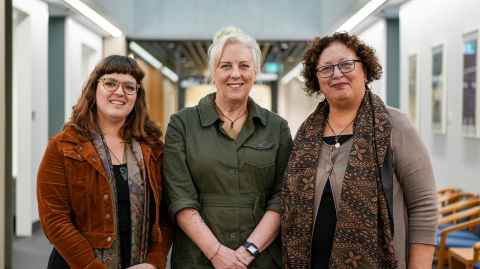LSD microdosing trial seeks 50 percent Maori
30 July 2024
An LSD microdosing trial aims to develop effective mental-health support for people with late-stage cancer in an equitable way.

A trial of LSD microdosing in late-stage cancer patients is under way at Waipapa Taumata Rau, University of Auckland, with the researchers aiming to include 50 percent Māori participants.
The research is recruiting 40 participants, 20 Māori and 20 non-Māori, with advanced-stage cancer, who will receive either a low dose of LSD or one of three possible placebos – an inactive compound, or two active placebos Ritalin or caffeine.
The LSD doses in the trial start at eight micrograms and can be decreased or increased up to 20 micrograms depending on participants’ responses. A typical dose of LSD people might take recreationally would be 80 to 100 micrograms.
Principal investigator Dr Lisa Reynolds, a senior lecturer and health psychologist in the School of Psychological Medicine at the University, says the trial is highly novel.
“As far as I am aware, there are no other studies investigating LSD microdosing with people who have cancer, nor any trials investigating LSD alongside an already validated psychological therapy, such as meaning-centred psychotherapy.
“Our hypothesis is that most participants in our trial will gain some benefit, as everyone will receive meaning-centred psychotherapy which has already been shown to provide benefit in this population. [See Cancer 2018].
“However, we hypothesise that people assigned to receive LSD microdosing will gain incremental benefit over the participants who receive the active placebo.”
The design of the trial has been guided by a group of advisers in the Aotearoa Māori Psychedelic Advisory Rōpū.
The trial aims to be culturally appropriate for Māori participants by taking a tikanga-based approach for example offering manaakitanga (hospitality) and whanaungatanga (building relationships).
One of the investigators and psychologists on the trial, Eva Morunga (Ngāpuhi, Te Rarawa), says the key for Māori is being in relationship, which is something all patients want.
“It’s about addressing inequities. It’s the fact our people come late to the hospital to get diagnosed and often, by then, prognosis isn’t great.”
Māori are 80 percent more likely to die of cancer than non-Māori (Unequal Impact, Robson et al.)
The early timing of this University of Auckland trial is ideal to future-proof any introduction of psychedelic microdosing into Aotearoa New Zealand, says doctoral student and study co-ordinator, Alesha Wells (Ngāti Awa).
“We have yet to make the move, like Australia has done, to change the regulations around psychedelic drugs,” Wells says.
“We’re in a prime position to make sure that any future interventions are developed with the needs of Māori in mind.”
Psychedelic-assisted therapies are introducing a different way of supporting people at a time of life when they are especially vulnerable, Reynolds says.
“A lot of existential things can come up at this time – fear of dying, feelings of isolation, depression and anxiety, and our options currently for psychological support are fair to middling. While some people gain enormous benefit from our current therapy options, there are others who just don’t.”
LSD microdosing with healthy volunteers has been shown to have acute benefits, such as increases in creativity, connectedness, happiness and wellness, and “these are the kinds of mood states in patients that may make them more receptive to psychological therapy,” Reynolds says. See a recent study led by the University of Auckland’s Robin Murphy in the journal, Society of Biological Psychology.
The trial aims to assess safety of LSD microdosing and the optimal dose, with a view to proceeding to a larger randomised controlled trial.
• If you are interested in finding out more, go to the study web page: aleshawells6.wixsite.com/website or email: wellbeingtrials@auckland.ac.nz
Media contact
Jodi Yeats, FMHS media adviser
M: 027 202 6372
E: jodi.yeats@auckland.ac.nz